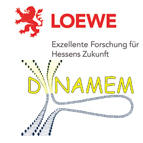News Archive
Funding for new LOEWE research cluster DynaMem
 July 2017. The new LOEWE research cluster „DynaMem”, short for “Dynamics of Membranes. Molecular basics and theoretical description”, will be funded with 4.4 million Euro over four years starting from January 2018. Involved in this project are the Goethe University Frankfurt, the Max Planck Institute of Biophysics, the Johannes Gutenberg University Mainz, the Max Planck Institute for Polymer Research and the Frankfurt Institute of Advanced Studies. With its LOEWE Programme the Hessen State Government funds outstanding scientific collaborative research projects. The State Government of Rhineland-Palatinate also contributes funds to DynaMem.
July 2017. The new LOEWE research cluster „DynaMem”, short for “Dynamics of Membranes. Molecular basics and theoretical description”, will be funded with 4.4 million Euro over four years starting from January 2018. Involved in this project are the Goethe University Frankfurt, the Max Planck Institute of Biophysics, the Johannes Gutenberg University Mainz, the Max Planck Institute for Polymer Research and the Frankfurt Institute of Advanced Studies. With its LOEWE Programme the Hessen State Government funds outstanding scientific collaborative research projects. The State Government of Rhineland-Palatinate also contributes funds to DynaMem.
The overarching aim of DynaMem‘s research is the algorithmic description and modelling of membrane dynamics. This will enable scientists to make predictions about the dynamic behaviour of membranes and how they react to interference.
Cells are the basic building blocks of living organisms. Cells and many of their intracellular components are surrounded by membranes. These membranes play an essential role as a spatial boundary for biological and chemical processes and allow spatial and temporal control of cellular processes.
The static properties of biological membranes are quite well understood. Major questions remain, however, regarding the regulatory principles behind changes of the membranes, the complexity of the dynamics of membrane systems and their physiological consequences.
DynaMem aims to clarify the molecular mechanisms underlying intracellular membrane dynamics and to understand the regulation of membrane dynamics in cellular complex systems. The cluster will also investigate the influence of smaller molecules on membrane dynamics. The new knowledge gained from these studies will help to optimize medical drug development for a range of diseases, for example Parkinson’s or neuromuscular diseases.
`Based on the results we can develop strategies to specifically influence membrane dynamic processes. Such knowledge is important for medical research since membranes change during aging and under stress. They play a role in the differentiation of cells and in programmed cell death. Here are important target molecules for medical drugs.´ explains BMLS Director Enrico Schleiff.
Contacts:
Enrico Schleiff (schleiff@bio.uni-frankfurt.de) and Achilleas Frangakis (achilleas.frangakis@biophysik.org), Buchmann Institute for Molecular Life Sciences, Riedberg Campus, Goethe University Frankfurt, Frankfurt am Main, Germany
Cluster of Excellence Macromolecular Complexes, Frankfurt am Main, Germany

